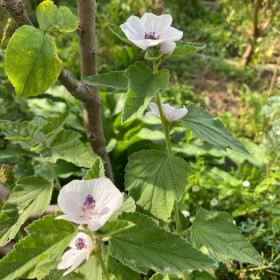This herb (Althaea officinalis) is not an ingredient in the popular campfire treat, although the original marsh mallow confection was the French pate de guimauve, made from the plant's root.
The Marsh Mallow plant has been used by many cultures as a medicine and even as a staple food during times of famine. Its generic name, Althea, is derived from the Greek word altho, which means "to cure." Hippocrates described althea as valuable in wound treatment.
Greek physician Dioscorides prescribed a vinegar infusion to cure toothaches and recommended that seeds be prepared to soothe insect stings. Herbalists of the Renaissance period used marshmallows for sore throats, stomach problems, gonorrhea, and as a gargle to treat mouth infections.
Medicinally, dried or powdered roots were applied as poultices to abrasions or eruptions. French druggists prepare a paste from the roots, which is emollient and soothing to a sore chest and considered valuable in coughs and hoarseness.Common name(s)
Althaea Officinalis
Common Mallow
Mauls
Mallards
Schloss Tea
Cheeses
Mortification Root
Plant ingredients
Marshmallow root extract is rich in asparagine, pectin, starch, sugars, tannins, and volatile oil, with excellent antioxidant, moisturizing and soothing properties.
